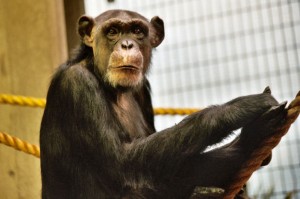 ATHENS, Ga. – A Ph.D. geneticist is receiving both support and criticism following his claim that humans evolved after a chimpanzee mated with a pig.
ATHENS, Ga. – A Ph.D. geneticist is receiving both support and criticism following his claim that humans evolved after a chimpanzee mated with a pig.
Eugene McCarthy is a geneticist from Georgia who founded the blog MacroEvolution.net. McCarthy received B.S., M.S. and Ph.D. degrees in genetics from the University of Georgia, where he worked as a researcher until 2007. On his Google+ profile, McCarthy describes himself as an “evolutionary theorist.”
Earlier this year, McCarthy published a lengthy article on MacroEvolution.net titled “Human Origins: Are we hybrids?” In the article, McCarthy suggests that humans evolved after a female chimpanzee mated with a pig.
“We believe that humans are related to chimpanzees because humans share so many traits with chimpanzees,” McCarthy writes. “Is it not rational then also, if pigs have all the traits that distinguish humans from other primates, to suppose that humans are also related to pigs?”
McCarthy believes hybridization is a reasonable explanation for the origin of humans, suggesting that “perhaps Darwin told only half the story.”
“The general examination of the process of evolution as a whole strongly suggests that most forms of life are of hybrid origin,” he writes. “Why should humans be any different?”
Though McCarthy is not fully convinced that humans are in fact chimpanzee-pig hybrids, he says his research is compelling. Not only do pigs and humans share certain genetic features, according to McCarthy, but their appearances are also comparable.
“This physical affinity of humans and pigs is easily observable in certain external features,” McCarthy observes. “For example, lightly pigmented eyes, in shades of blue, green, and tan, are never found in chimpanzees or orangutans. … Why, then, are they common in certain human populations? Where did this trait come from? One conceivable explanation is that it was inherited from blue-eyed pigs.”
McCarthy admits that he “initially felt a certain amount of repugnance at the idea of being a hybrid,” since “[t]he image of a pig mating with an ape is not a pretty one.” Nevertheless, he is now more comfortable with the idea of both chimpanzee and pig ancestors.
“[T]he way we came to be is not so important as the fact that we now exist,” McCarthy posits. “Moreover, there is something to be said for the idea of having the pig as a relative.”
Although McCarthy’s theory has received criticism from some evolutionists, others are convinced by his research findings. For instance, one reader responded by saying, “I’m stunned, amazed, and converted.”
“As a clinician and scientist with medical training, it is a joy to find a theory so carefully and elegantly presented,” another commented. “What a revelation! Surprising and shocking. Such is the nature of truth sometimes. Life will never be seen in the same way after reading this work.”
However, scientists who believe in Biblical Creation reject the claims of McCarthy and other evolutionists, explaining that similar design characteristics between species is evidence of a common Creator—not common ancestors.
David Menton, a biologist with Answers in Genesis, told WND that—even though hybridization is possible—McCarthy’s claims are “ludicrous.”
“These hybridizing experiments [McCarthy is] doing are of interest to us, because many species of animals could come from just one ‘kind,’” Menton remarked. “The Bible uses the word ‘kind’ to describe the animals aboard Noah’s ark; such as all dogs, wolves and coyotes could be considered of one ‘kind.’ One pair, then, could lead to the diversity we see within kind today; so hybridizing experiments are extremely interesting.”
Nevertheless, Menton said, McCarthy’s assertion that humans are descendants of a chimpanzee and pig is mere “speculation.” McCarthy’s claims rather reveal that evolutionists are increasingly dissatisfied with Darwin’s evolutionary theory, he continued.
“There is, in fact, a growing dissatisfaction among scientists, even those who are not coming at this from a creationist viewpoint, decidedly non-creationist scientists,” he stated. “Even those who are crass materialists know there has to be something else besides ‘survival of the fittest’ to explain what we see.”
“Evolutionists need to find something besides [Darwin’s] 150-year-old, tired ideas of random mutation and natural selection,” Menton suggested. “They’re reaching for something.”
“But when we go from recognizing zebra/donkey or sheep/goat animals of same kind to mixing chimp and pig to get humans, that is off the map,” Menton said.
Become a Christian News Network Supporter...


